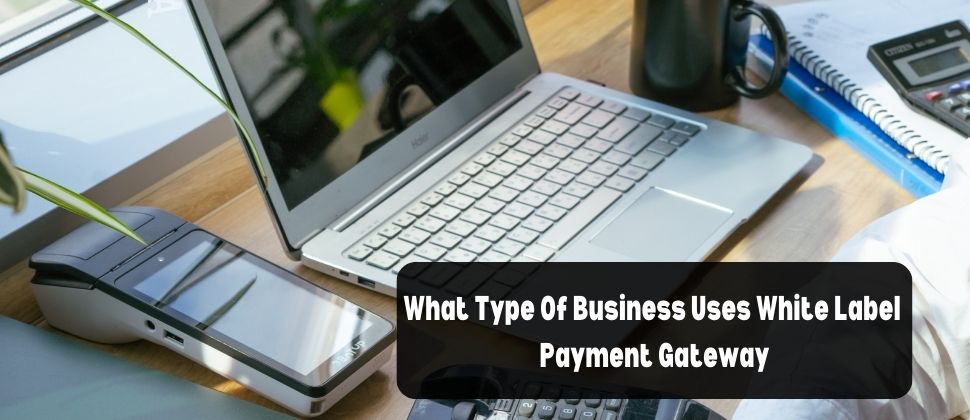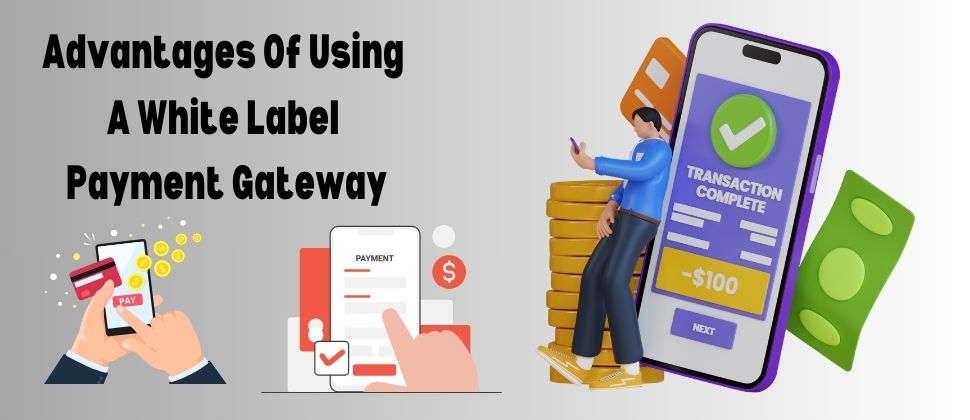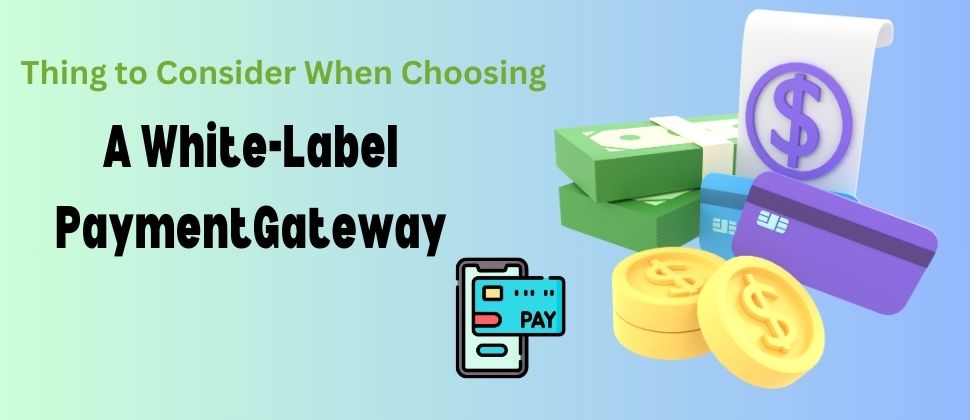For entrepreneurs looking to grow their businesses, the financial industry plays a crucial role. Staying updated on the latest trends is key to success. If you’re exploring payment gateway options, you might have come across ‘white label payment gateways.’ In this blog post, we’ll break down what exactly a white-label payment gateway is. In basic terms, it’s a customised payment system that particular businesses offer. This implies that you can use it without having to deal with the headache of starting from zero while developing a payment system. We’ll go into the advantages and specifics of how this technology might improve the payment procedures used by businesses and provide them with a competitive edge. So let’s get started and learn more about white-label payment gateways.
Understanding Payment Gateway & How It Works?

Before exploring the details of what a white-label payment gateway is, let’s first explore the fundamental concept of a payment gateway and its operational mechanisms. A payment gateway is the technological intermediary that companies use to receive and handle payments made online. Acting as a bridge between a customer’s chosen payment method, whether it be credit cards, digital wallets, or bank transfers, it ensures the swift and secure transfer of funds. The payment gateway is essential for encrypting private data, confirming the validity of the transaction, and putting fraud prevention measures in place. It acts as an essential element in the framework of online payments, promoting efficiency, security, and confidence for both companies and their clients. Here is how it works.
- Initiation of Payment Request- When a customer completes their purchase on an online platform, the process starts with the customer initiating a payment request.
- Data Encryption for Security- Sensitive data, including credit card numbers, is encrypted during transactions to increase security. Through the use of a secure code created during this process, unauthorised access to the data is prevented during transmission.
- Routing- Following encryption, the data is sent to the payment gateway via a secure connection.
- Authorization- In order to authenticate and approve the transaction, the payment gateway subsequently communicates with the supplier of the relevant payment method (such as a credit card issuer). In this phase, the customer’s credentials are checked, and the availability of funds is confirmed.
- Order Fulfilment- The transaction moves on to the order fulfilment phase when it has been approved. This involves verifying the transaction and assisting with the delivery of products or services.
- Seamless Fund Settlement- Finally, the payment gateway facilitates the settlement process, ensuring the seamless transfer of funds from the customer’s account to the merchant’s account.
Pro Tip: Learn how transcription services in Australia are revolutionising businesses and lives, enhancing accessibility and productivity through accurate and efficient documentation.
What Is A White Label Payment Gateway?

Now that we understand what a payment gateway is, let’s talk about a white-label payment gateway. Consider it a ready-made payment system that businesses can customise and make their own. This way, companies can offer customised and secure payment solutions without the hassle of starting from scratch, which can be expensive and time-consuming. To put it in a simpler way, a white-label gateway is an exclusive pass that allows companies or brands to manage online payments under their own name while depending on third-party knowledge. The “white” in “white label” refers to the product’s manufacturing partner; it’s similar to receiving an empty surface on which a brand can apply its own label. It’s a clever method of claiming a service without starting from scratch.
White-label payment gateways offer versatile support for various payment methods, including credit/debit cards, digital wallets, and bank transfers. This flexibility allows businesses to adapt to their customers’ preferences. Moreover, it can manage different currencies and languages, facilitating business expansion into international markets.
What Type Of Business Uses White Label Payment Gateway

- Software-as-a-Service (SaaS) Providers
To improve the customer experience, SaaS vendors who offer subscription-based software solutions integrate white-label payment gateways. This enables them to manage subscription payments seamlessly while also giving their clients a branded and user-friendly payment experience.
- E-commerce Entrepreneurs
E-commerce enterprises use white-label payment gateways to improve their payment procedures in the fast-paced world of online retail. Customization is essential for branding, and these gateways offer a safe and personalised checkout experience, building trust and customer happiness.
- Banking and Financial Institutions
White-label payment gateways are used by established financial institutions to upgrade their digital payment infrastructure. This strategic adoption enables them to provide a branded, secure, and user-friendly online payment experience, matching their clients’ growing expectations in the digital age.
- Startups and Small-Medium Enterprises (SMEs)
White-label payment gateways are a cost-effective solution for startups and SMEs with limited resources. By integrating pre-built systems, these organisations may quickly build dependable payment processes without the need for considerable development, allowing them to enter the market more quickly.
- Multi-level Marketing (MLM) Businesses
White-label payment gateways are used by multi-level marketing companies to facilitate transactions within their own sales systems. This allows distributors to easily manage their sales and commissions through personalised web stores, which contributes to the effectiveness of their business model.
- Launching Payment Services with White Label Solutions
White-label gateways provide a launching pad for entrepreneurs looking to enter the payment processing sector. They can establish a market presence without the complexity of developing a payment gateway from scratch by rebranding existing solutions, allowing for faster entry and market testing.
- Other Types of Resellers
White-label payment gateways provide significant value to a variety of resellers, including Value Added Resellers (VAR), Independent Software Vendors (ISV), and Independent Sales Organizations (ISO). This adoption enables them to improve their product offerings by providing personalised payment solutions adapted to their client’s specific demands, hence adding value to their services.
Pro Tip: Transform your e-commerce website into a thriving online powerhouse with the expertise of the best digital marketing agency.
Advantages Of Using A White Label Payment Gateway

- Cost and Time Efficiency
Adopting a white-label payment gateway saves companies the huge costs and labour-intensive procedures involved in building a payment system from scratch, making it a wise financial choice. Businesses are able to spend resources more strategically thanks to this efficiency.
- Control and Customization
Businesses can connect payment operations with their distinct brand identity by using white-label payment gateways, which provide them with a degree of control and customization. This control also applies to customising user experiences, allowing for a smooth transition between payment processes and the general look and feel of the business.
- Security and Compliance
Using well-known white-label payment gateways guarantees improved security protocols and adherence to rules and guidelines within the industry. Businesses can reduce risks, safeguard sensitive data, and more skillfully negotiate the challenging world of financial compliance by utilising tried-and-true technologies.
- Additional Passive Revenue Stream
Integrating a white-label payment gateway introduces an additional passive revenue stream, a valuable asset that contributes to overall financial stability. This income source, often underutilised by many businesses, can bolster revenue streams without necessitating significant additional effort.
- Competitive Edge through Convenience
Offering greater freedom and convenience to customers becomes a powerful competitive edge. White-label payment gateways empower businesses to provide a seamless, branded, and user-friendly payment experience. This not only enhances customer satisfaction but also positions the business as a leader in user-centric solutions within the industry.
- Established Credibility
The decision to use a white-label payment gateway allows businesses to establish added credibility. By processing payments under their own name and logo, companies instil trust in customers, setting them apart from competitors who redirect users to third-party providers. This trust is an essential element in fostering lasting customer relationships.
- Access to Merchant Features
Despite rebranding, businesses retain seamless access to all the essential features of the white-label gateway. This includes robust payment processing capabilities, state-of-the-art encryption methods, and sophisticated fraud detection tools. Such continued access ensures that the business maintains optimal functionality and stays ahead in its payment operations.
Considerations While Choosing A White-Label Payment Gateway

- Identify Business Needs and Objectives
Start by comprehending the needs and objectives of your firm. Determine the precise characteristics and capabilities that a white-label payment gateway must have. Take into account variables including the number of transactions, the kinds of payments you wish to accept, and any special features that complement your company’s goals.
- Cost and Benefits
Examine the advantages and disadvantages of incorporating a white-label payment gateway generally. Take into account all associated expenses, including setup fees, recurring fees, transaction fees, and any additional hidden expenditures. Compare this to the advantages the solution provides, such as more customization options, scalability, and the possibility of generating new revenue sources.
- Provider and Products
Research and select a reputable company that has a history of providing high-quality white-label payment gateway services. Examine the provider’s track record, client testimonials, and product selection. Make sure they can accommodate your unique business requirements and offer the required assistance.
- Ensure True White Label Capability
Make sure you are able to promote the selected provider’s services under your own name. You should be able to offer the payment services to your clients under your own brand, not the provider’s, with a true white-label gateway. It might not be a true white-label solution if the supplier is adamant about keeping their name and logo.
- Built Infrastructure
Ensure that the basic infrastructure of the white-label payment gateway is already well-established. This includes considerations for design, functionality, and security. The solution should be easily integrable on behalf of your customers, utilising a straightforward API or plug-in. A robust foundation ensures smoother implementation and ongoing operation.
- Simplified Integration
Select a payment gateway with white labelling that provides streamlined integration procedures. Simple-to-use plug-ins or APIs should be offered by the solution to enable smooth integration with your current systems. This guarantees a simple and effective process for your clients when connecting to the payment gateway.
- Scalability
Think about how scalable the white-label payment gateway is. Make sure the system can expand to accommodate your expanding company and handle higher transaction volumes. This adaptability is essential for allowing businesses to grow without having to constantly alter or interfere with the payment process.
- Support and Training
Assess the degree of assistance and instruction offered by the provider of the white-label payment gateway. Make sure they provide thorough support during the integration process and continuing assistance for any problems that may come up. It’s also important to have enough training materials on hand to guarantee that your staff is capable of managing and optimising the payment gateway.
Pro Tip: Gain insights into essential tips and avoid common mistakes when starting a new business venture.
Downside Of Using A White Label Payment Gateway

While white-label payment gateways offer advantages, it’s important to consider their potential downsides.
- If your business doesn’t specifically need white-label services, the associated costs may be unnecessary.
- Additionally, these gateways often pose challenges in customization, limiting options for tailoring the checkout experience.
- By using a white-label gateway, your business reputation is at stake, demanding hyper-diligence in maintaining PCI compliance and preventing fraud.
- Any issues or breaches can reflect negatively on your business, potentially leading to fines and legal actions, emphasising the need for careful consideration before opting for such a solution.
Pro Tip: Explore the significance of digital wallets in today’s financial world. Learn about digital wallets, get suggestions, and experience a more convenient future.
Conclusion
In this comprehensive guide to white-label payment gateways, businesses can explore a versatile solution for optimising their payment processes. Offering the flexibility to customise and rebrand existing payment systems, a white-label payment gateway empowers companies to provide a seamless and secure payment experience under their own name. Throughout this guide, we’ve delved into the benefits, including cost efficiency and control, while also highlighting potential drawbacks such as unnecessary costs and limited customisation options. By carefully considering these factors, businesses can make informed decisions on whether a white-label payment gateway aligns with their particular needs and goals.




